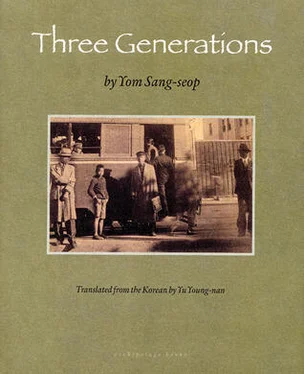Of course, the situation concerning Deok-gi and his family was another matter and could be handed over to the Judiciary Police depending on what developed, but Geumcheon, as an inspector of the High Police, had another goal. If Deok-gi’s grandfather had in fact been poisoned and the main culprit was Jo Deok-gi, Geumcheon was certain that Kim Byeong-hwa was behind it. When a rich man’s son and a communist are so close, it isn’t merely a friendship between old schoolmates. The Kyoto Police Division’s investigation, conducted at the request of the Keijo police, showed that although Deok-gi had not acted in a particularly suspicious manner, the bookcase in his boardinghouse was noticeably ridden with books on Marx and Lenin. Furthermore, Deok-gi had given Byeong-hwa a thousand won to help him open a business — this after the two young men had been frequenting Bacchus throughout the winter, a bar whose proprietress was suspected of communist inclinations. Based on these facts, it looked like Jo Deok-gi could be what they called a sympathizer. And when one considered that the Jo family assets, for no apparent reason, had been passed over Jo Sang-hun, the legal inheritor, and given to the grandson, it certainly seemed that Byeong-hwa had to have played a role in some kind of conspiracy. The situation had already lent itself to such speculations, but the rumor that the old man had been poisoned and that the doctors had been bribed fanned the flames of Geumcheon’s suspicions. It was time to take matters into his own hands.
The police chief had kept Geumcheon at bay for several days, insisting that they wait until they had obtained solid evidence, but he finally gave in to his subordinate’s conviction.
The police chief, wary of his underling’s ambitious zeal, had another goal in mind. Two or three months had passed since the winter roundup, and it stood to reason that the remaining agitators would be engaged in something or other, though everything appeared calm on the surface. Kim Byeong-hwa had, out of the blue, started a grocery business — a Japanese-style grocery at that. Numerous pieces of intelligence poured in from overseas but only one or two out of ten were useful. No matter how many of his informants he tapped, he wasn’t able to get any further details on the activities of the agitators still at large. At present, the leaders in Seoul had more or less been rounded up in one big sweep, and of the moderates, Kim Byeong-hwa and Jang Hun were the principal figures. But no one knew what might lurk beneath the tag “moderate.” The chief had to admit that Geumcheon was on the right track.
In any event, after the police chief consented, Geumcheon mobilized his subordinates and began rounding up the suspects, starting at the bottom of the ladder.

When Deok-gi arrived at Sanhaejin, the doors were tightly shut. He feared the worst. As he was turning away from the store, dejected, Pil-sun’s mother approached him from out of the darkness.
“It’s you!” she cried out. “What brings you here this late?”
“I heard your daughter was taken away. You must be so anxious!”
“I don’t know what to do. Byeong-hwa was arrested a while ago. He called me at the hospital and told me to meet him in front of the Gyeonggi Provincial Government Office to give me the keys to the store and the money. They dragged him off right away. I don’t know what’s going on. What should I do?” The woman was on the verge of tears.
“How is your husband doing?”
“I can’t believe this is happening. My husband’s pneumonia is getting worse, and we’ve ended up making trouble for other people. I see nothing but darkness.” She fumbled with the keys as she let them in. There was a chill in the air. The neat rows of groceries on the shelves were untouched by the recent turbulence.
While Pil-sun’s mother tidied up, Deok-gi called Bacchus and learned that Gyeong-ae’s mother had been taken to the Police Division as well.
“How can they sweep them all up like that?” There would be no one left to care for her sick husband if they brought her in as well.
“Try not to worry too much. I’ll do my best to get them released soon.” To calm her, he told her that he’d visit the High Police chief the next day. After she brought in the items that would freeze, Deok-gi accompanied her to the hospital on his way to Hwagae-dong. He wanted to see his father, now that he was up and about, and was curious to know whether the rapacious hands of the police had reached his father’s house.
As Deok-gi entered the house, a game of mahjong was in full swing in the outer quarters, with the doors tightly locked. “I’m glad you’re here,” said Deok-gi’s father. “I heard that the Police Division took Won-sam.”
Deok-gi nodded.
“What’s going on? They came for Clerk Choe while he was visiting.”
“Clerk Choe, too? I had no idea.”
“I hear they inquired about Chang-hun as well. Isn’t that odd?” Deok-gi’s father, in the middle of heavy gambling, sounded extremely nervous.
“I think I may be able to find out what’s going on tomorrow,” Deok-gi answered vaguely, before he left. Without knowing precisely what was going on in the inner quarters, his heart sank. He couldn’t stand watching his father fritter away good money.
As soon as he got home, Deok-gi heard that Secretary Ji was the latest to be arrested. It troubled him deeply that old Ji would have to stay in jail in this cold. Knowing that the authorities were approaching, a wave of anxiety swept over him, though in his heart he knew nothing would come of it.
Sleeping in fits and starts, Deok-gi managed to get through the night and went to the Police Division early the next morning. Aware that he would be taken away eventually, he wanted to see the High Police chief as soon as possible. But the chief wouldn’t see him. Instead, Geumcheon called him in. The detective was delighted that Deok-gi had come in of his own accord. Preventing Deok-gi from seeing the chief had been Geumcheon’s doing.
The case was being investigated by two different police branches. Pil-sun, Gyeong-ae, and her mother, along with Byeong-hwa and Jang Hun, were to answer to the High Police, while Secretary Ji, the Chinese doctor, and Clerk Choe were being questioned by the Judiciary Police. Won-sam and his wife, and now Deok-gi, were in the spotlight of both branches.
They were trying to discover why the majority of the Jo family assets were left to Deok-gi. Why did he oppose the performance of a postmortem on his grandfather, and why did he pay the doctors excessive gratuities? Why did he help Byeong-hwa? How many left-wing books did he read? Deok-gi answered these questions as clearly as possible.
His grandfather had disliked his own son and hadn’t trusted him, having clung to the conviction, verging on superstition, that his son would squander the family’s wealth during his own lifetime. It was not for Deok-gi himself, but for the sake of the Jo descendants, that the grandfather had entrusted Deok-gi with roughly five times that which he had left to his son. As for the postmortem, he opposed it for two reasons: he shared the reluctance many people have about cremating their parents’ bodies, and he didn’t want to sully his family name by doing something dishonorable. Deok-gi simply could not accept the notion that his grandfather had been poisoned. He did not consider the gifts he offered the doctors to be excessive in light of his name and social position. They were tokens of gratitude. Perhaps the strongest evidence of Deok-gi’s innocence was the fact that his grandfather had entrusted him with the key to the family safe while he was still alive. Even the Suwon woman, who was summoned the next day, had to attest that she had seen the old man give Deok-gi a ring of keys after his arrival from Kyoto.
Читать дальше













